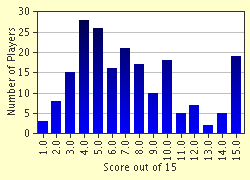Quiz Answer Key and Fun Facts
1. Are the deuterocanonical books included as part of the Jewish Bible?
2. What does the term "Apocrypha" mean?
3. In this book, the demon Asmodeus slays the heroine's seven husbands on their wedding nights.
4. The heroine of this book pretends to spy against her own people, only to avail herself of the opportunity of decapitating the commander of Nebuchadnezzer's forces.
5. Two Jewish elders, out of lust for this woman, tell her to have sex with them or risk being accused of committing adultery with a young man.
6. According to Daniel 14, the destruction of what idol leads to Daniel being thrown in the lion's den?
7. Which of the following books tell the story that forms the basis for Hanukkah?
8. The Book of Wisdom was written by Solomon.
9. What is another name given to the Book of Sirach?
10. What deuterocanonical book is ascribed to the secretary of the prophet Jeremiah?
11. Verses from this passage are used in the liturgy of the Episcopal Church of the U.S.A., as part of the "Rite One Morning Prayer."
12. In the additional parts of Esther, what character has a dream vision?
13. Which of the following appears in the Septuagint (an early Greek translation of the scriptures), but not among the deuterocanonical books accepted by Catholics?
14. The Orthodox Church also considers most of the deuterocanonical books to be canonical. But which book, included in the Catholic Old Testament, is rejected by the Orthodox Church?
15. Did the original King James Version of the Bible include a translation of the deuterocanonical books?
Source: Author
skylarb
This quiz was reviewed by FunTrivia editor
gtho4 before going online.
Any errors found in FunTrivia content are routinely corrected through our feedback system.

